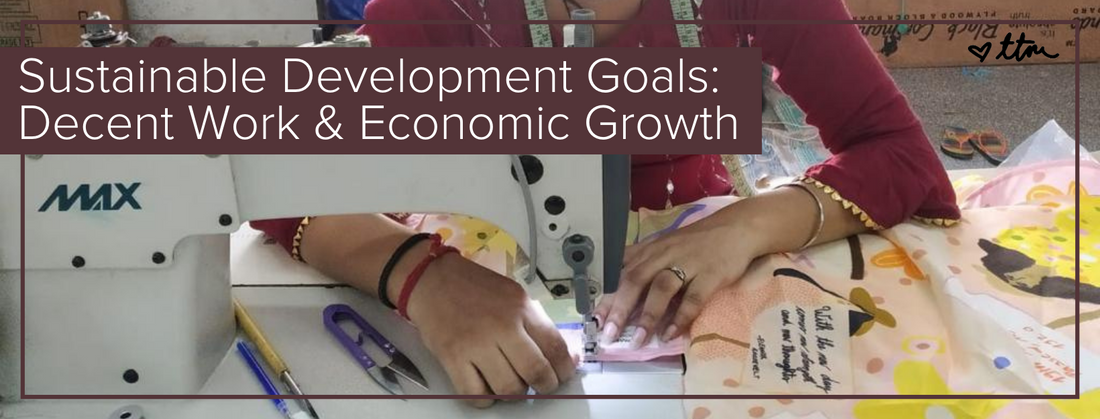
Sustainable Development Goals: Decent Work & Economic Growth
Share
Welcome to the next installment of our series on the United Nations Sustainable Development Goals, or SDGs. This week, we’re covering Decent Work & Economic Growth.
Everyone deserves the opportunity to support themselves through safe, fairly paid, decent work. No matter where you are in the world or what walk of life you’re in, you should never have to choose between your personal safety on the job and putting the food on the table for your family. That’s why we at TTM feel so strongly about Decent Work & Economic Growth, one of the United Nations’ Sustainable Development Goals. And of course, with the COVID-19 pandemic disrupting labor markets around the world, we’re at an especially precarious time for underemployment and potential worker exploitation.
According to the UN, this SDG aims to “promote sustained, inclusive, and sustainable economic growth, full and productive employment, and decent work for all.” It’s vital that we work together as a global community to build an economy that provides equitable opportunities for all. Also important is that we look beyond the short-term temptation of climate-damaging production methods, and instead focus on sustainable economic practices that protect the planet. If we neglect our environment, we’re setting ourselves up as a planet for far worse economic issues and inequalities down the line, so sustainability is in everyone’s best interests.
A Few Things To Know:
-In 2016, 61% of the world’s workers were in informal employment, which is generally defined as work that is not formally monitored, taxed, or regulated by a governing body. Informal employment often leads to more vulnerability for employees, who may not be protected if they lose their job unexpectedly or are mistreated while working.
-According to the UN, about 1.6 billion workers in the economy - half of the world’s workforce - were significantly impacted by the Covid-19 crisis. Many remain unemployed or underemployed as the world continues to combat the pandemic.
-Workers in the informal economy lost an estimated 60% of their income in the first few months of the pandemic.
-In 2017, a global study by the International Labour Organization found a factor-weighted gender pay gap of 19%.
-In 2019, 22% of the world’s young people were not employed, in training, or in school. This number has barely changed since 2005.
-In 2018, the rate of growth of global real GDP per capita was 2%, with the rate of growth for the least developed countries at 4.5% - all less than the 7% growth rate that the UN is aiming to reach by 2030.
The Covid-19 Pandemic
As these stats point out, there was plenty to improve about global working conditions even before the Covid-19 pandemic hit. Now, we’re experiencing an unprecedented disruption in worldwide employment. Informal employees, daily wage earners, and the self-employed have been hit especially hard. As a company, we’ve seen firsthand working with our talented makers over the years that when there are no jobs in a community, the entire community suffers - not just workers themselves.
While worldwide recovery is going to take time, there are small steps we can all take to look out for workers’ rights along the way. We can remain conscious about where our dollars are going, and support companies and brands whose labor practices align with our values. We can spread awareness about workplace exploitation and make sure companies know that we as consumers care about the treatment of the people who make the products on shelves.
Goals For Improvement
Here are some of the key targets the UN has laid out for this goal:
-Diversifying, upgrading technology, and innovating global industries to create more safe and productive jobs.
-Increasing development of efficient, sustainable consumption to help separate economic growth from environmental damage.
-By 2030, having safe and decent work for anyone who wants or needs it, regardless of gender, ability, or age. This work should be equally paid regardless of gender or other factors.
-Eradication of forced labor, child labor, and modern slavery (including the recruitment of child soldiers) by 2025.
-Promotion of safe working environments for everyone on the job, including migrants and workers who may feel especially vulnerable to mistreatment.
-Creation of policies that promote sustainable tourism and tourism-related job growth by 2030.
While there is a long way to go before we truly reach global workplace equality and labor protections, there are certainly reasons to be optimistic. More and more consumers are communicating to companies with their dollars that employee safety matters to them. Slowly but surely, more global policies are encouraging safe workspaces and sustainable economic practices. And while economic recovery from the Covid-19 fallout will be a long road, we will get there. In the meantime, let’s look out for the global working population in any way we can.
Stay tuned for more blog posts in our ongoing SDG series!
